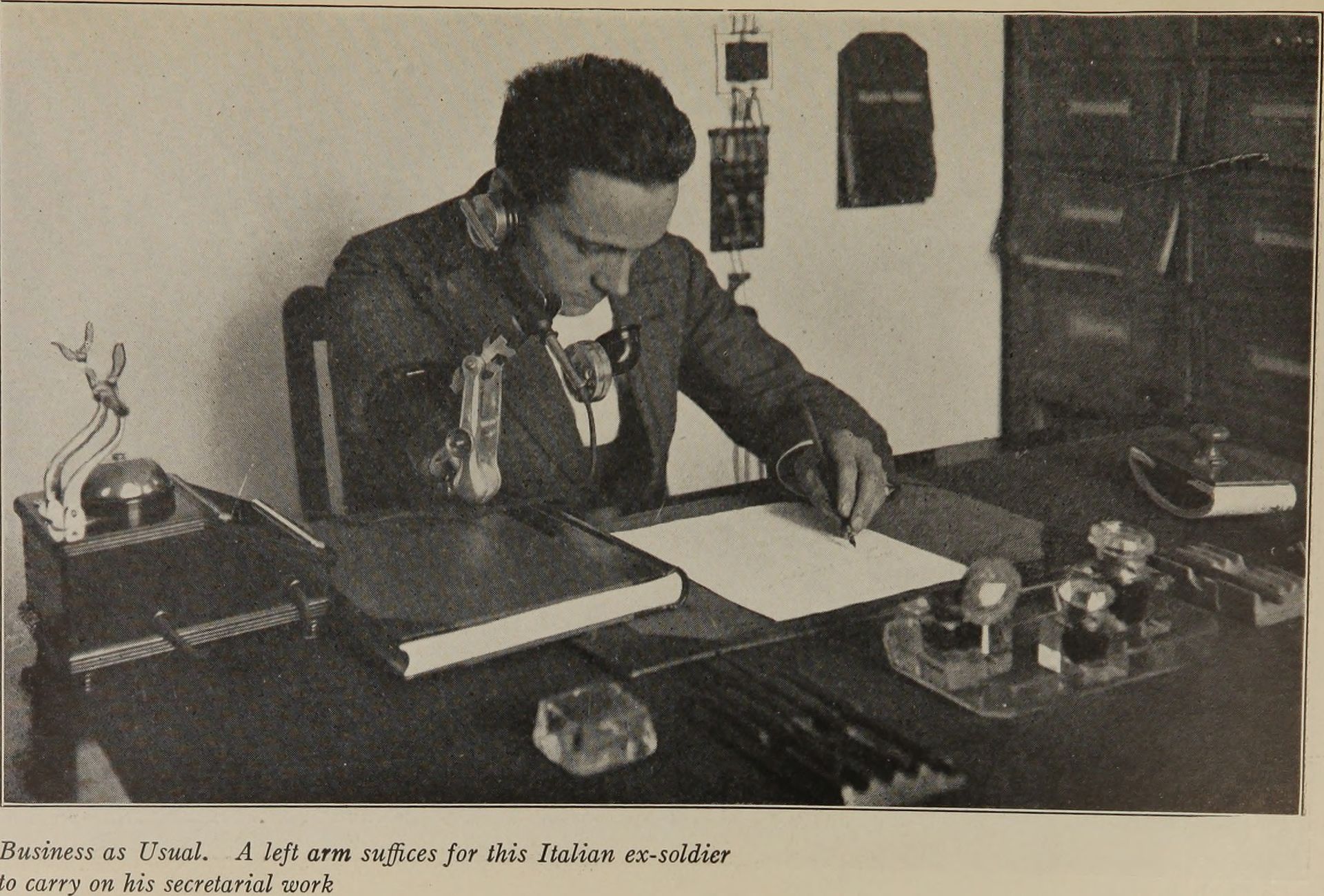
As one inducement to joining the forces many employers promised to hold jobs open for men until their return from the front. In many cases this was regarded as almost a contractual obligation;the man went to France or Gallipoli to fight for interests in which his employer shared; the latter agreed that the enlisted man should not lose his place through following the course of duty. So keen was the feeling regarding this reciprocal responsibility that there were even discussions in Parliament as to whether employers should be required by law to make good their promises.
It was pointed out, quite logically, that there was usually no written evidence of the promise; that the employer worth working for would live up to his word, and that in the case of any other the man would profit by finding another job. The authorities have, however, secured the cooperation of chambers of commerce in registering officially employers commitments in this regard.

At the end of the course, the students have to pass a very strict examination before a jury of physicians; they are never discharged before receiving their diploma. Since February, 1917, a group of graduates from Reuilly have been employed as masseurs in the military hospitals of Paris, and have given great satisfaction to the medical authorities. Others have found employment at the different resorts, at Monte Carlo,Vichy, Evian, Deauville. A shoe-repairing shop was established in February,1916. The work was first confined to pegged shoes, but later an invention of one of the students made possible hand-sewn work also.
Several men have graduated and found employment. The first pupil of the shoe making school is now employed as an instructor in a work shop for blind civilians. A machine shop, under the direction of a blind instructor, has been in operation for two years. The first twelve pupils are now working in a special shop created for war blind.

Manufacturing of artificial limbs and orthopedic appliances, wireless telegraphy, and horticulture. Instruction in shop work in the manufacture of artificial limbs has been found most successful. The shop renders services which are considered indispensable.It studies the needs of the workmen in the different trades, designs useful appliances for them, and produces any special device needed for a given purpose.
The trade is appropriate for men who have worked with either wood, metal, or leather, and has recruited its pupils from the ranks of men who were mechanics,blacksmiths, wood and metal turners, harness-makers,plaster workers, and shoemakers before the war.
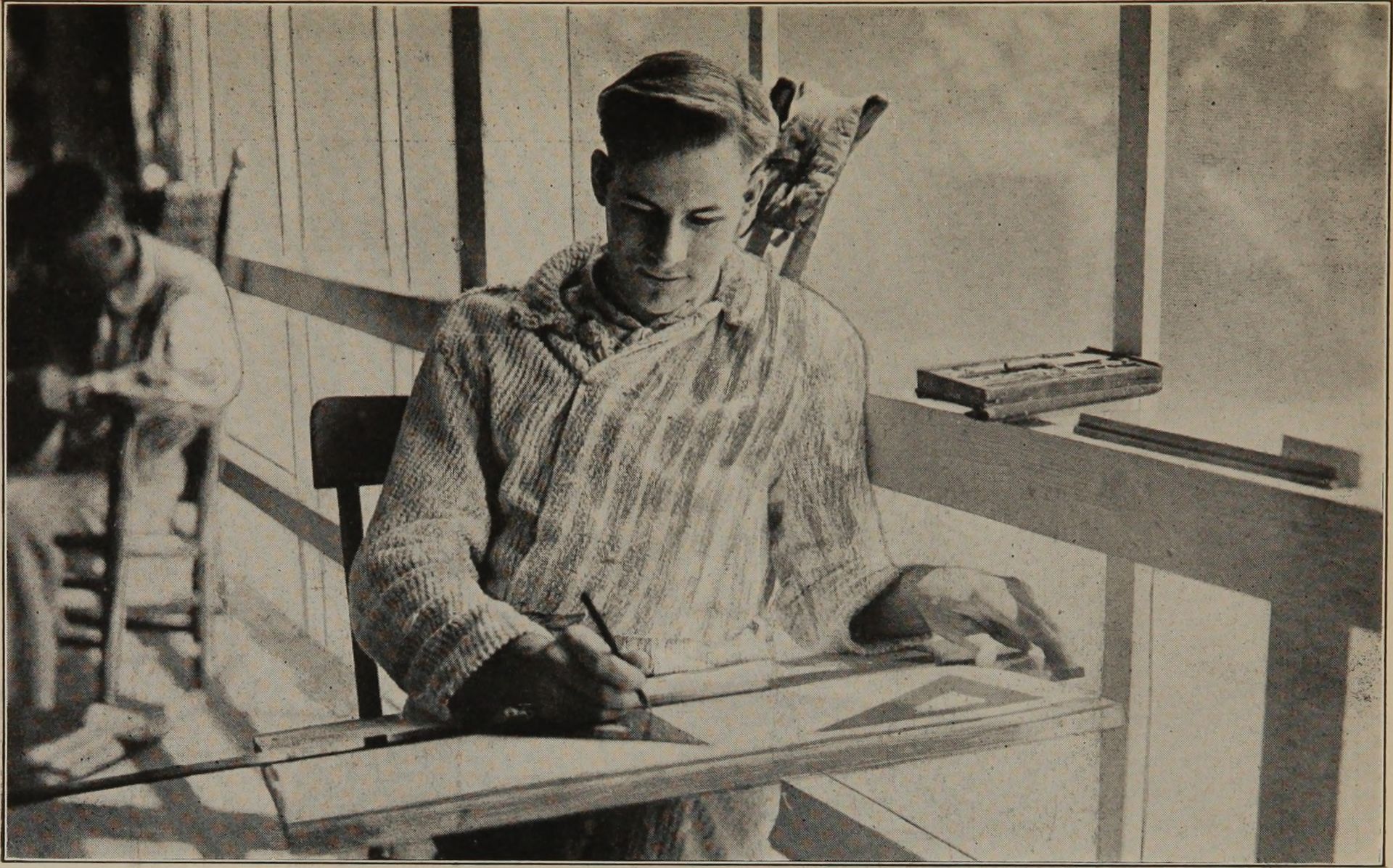
Rows of white beds along both sides, and with the occupants of the cots lying quietly back on the pillows waiting to get well. One can imagine the state of mind such an existence would engender. Every worry,every apprehension, every symptom possible of adverse interpretation would get one hundred per cent, attention from the patient. And in competition with this mental concentration on self and self ills, there is nothing but the once-daily perfunctory statement of the doctor:You are getting on very well.
That a worried and fretful mental state has an injurious reflex upon the course of an invalids recovery is well known. Any means, therefore, by which the mind maybe occupied and directed to some other object than the patients own ills may be expected to have beneficial results. Experience has shown that one of the most effective curative agents at the disposition of the physician is occupation. Simple work of the hands can be started while the patient is still ill in bed.

The loss of a right arm does not prevent this British soldier from doing useful work in a laboratory KINGDOM AND DOMINION 195 industry for many types of disability, and the enterprise has been successfully conducted on a sound commercial basis. The plans of the society contemplate facilities in the eleven workshops in different parts of the country for the accommodation of between four and five thousand men. Great Britain's colonies have, one by one, followed the trail blazed by the pioneers of re-education and are now admirably equipped to offer training and employment to the disabled soldiers of their own forces. Canada, Australia, New Zealand, South Africa, and India all are now prepared to receive from the battlefields those whom they sent forth, to fit again for civilian pursuits those whom war has maimed. Great credit is due our neighbor on the north for her promptness in making provision for her disabled men.
Still in the National Service, making submarine fittings. A Wage-Earner Once More.
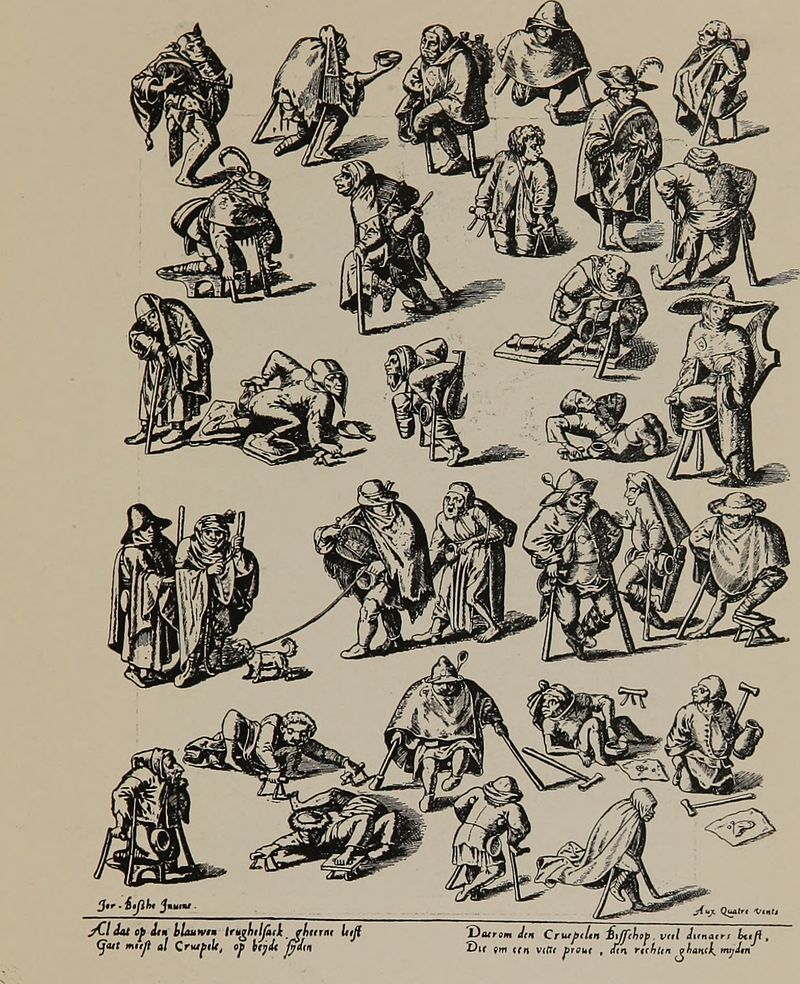
A Reproduction from a plate in an 1809 edition of Goldsmiths works RECORD OF INJUSTICE 23 forth as a soldier and return maimed was to be maintained competently the rest of his life. Eight years later,the Virginia Assembly passed a disability pension law,and not long thereafter another law creating a system of relief for the needy dependents of any colonist killed in the service of the colony. Long before the Revolution, other colonies had taken similar measures, Rhode Island not only providing pensions for the disabled and for the dependents of those killed in service, but also decreeing that every wounded soldier was entitled to medical care at the colony's expense until cured.
The Disabled Sailor Approaches Oliver Goldsmith

A civilian is accustomed to order his meals, to do everything for himself. He goes into the army and serves four years,during which time all his meals are chosen for him. The hour when he should go to his meals is decided for him.Suddenly wounded, he is no longer fit to be a soldier,and turned out into the world to unlearn just those things which have been taught him with such pains and effort. With regard to the reluctance to take up again a regular routine, it can be argued that a man must, sooner or later, re-assume his civilian responsibilities, and that this will be much easier and more
satisfactory if he has prepared to meet them. The third consideration is that the soldier has been away from home for a long period, and his most urgent desire is to get back to his family and friends. Against this desire, a discussion of prospects for the future does not seem to carry much weight.

There are four stages in the treatment of the disabled soldier: (1) medical treatment; (2) provision of artificial limbs and functional re-education; (3) vocational advice and vocational re-education; and (4) placement. Of these activities, the first two are controlled by the imperial military authorities and are conducted on uniform lines. With regard to vocational and economic rehabilitation, on the contrary, there is no general direction given by any central authority; the re-education schools are of varying types and most unevenly distributed; the work is in the hands of local and private or semi-private agencies; it is done mostly by volunteers and is not even supervised by the imperial government. However, in spite of the absence of any general system of organization, there is a complete unity of purpose and the work is everywhere carried on in accordance with certain universally accepted and officially sanctioned.
At Work Again—With Four Artificial Limbs. Germany sees to it that her disabled soldiers are prepared for self-support.

If foreign-speaking his chances may be improved by teaching him to speak English. Luckily, however, cases of this character will be few among men of our own forces, by reason of the high standards of admission to and retention in the army. A densely stupid man would never get as far as the front line overseas. The courses of training must be intensive and practical rather than theoretical. Every feature of instruction must be evaluated according to whether it affords direct assistance to the mans earning a living. A mistake that has often been made especially by universities and other institutions of higher learning is to give the disabled soldiers the elementary first-year schedule of a regular four-year course. This gives them a little of everything and complete familiarity with almost nothing. What must rather be done is to pick the essential and practical features out of the whole four-year program and condense them into the compass of a short course.
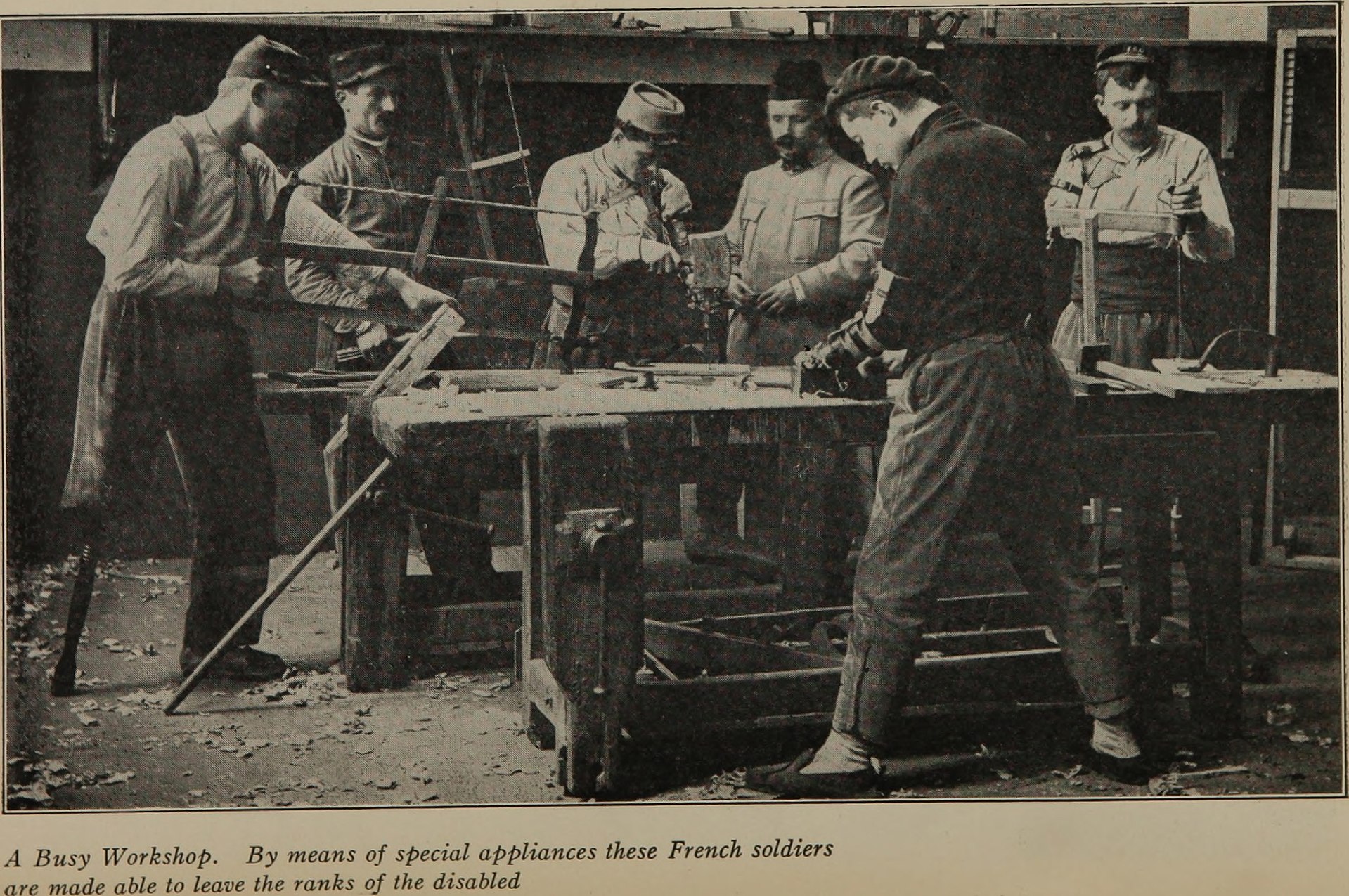
The jobs of some of the disabled men who can return to their former occupation will, however, have disappeared, due to suspension of operation, business failure, and other causes. The placement in these instances is comparatively simple, for the only necessity is to find the man a similar job. Still other men, however, who remain handicapped economically have not had or do not take advantage of re-educational opportunities. For such every resource of skilled employment technique is called into play.
AT WORK AGAIN 81
One of the most difficult tasks in the placement of disabled soldiers is to prevent their exploitation by employers who might argue that, as the man is in receipt of a regular pension from the government, he can afford to take a job at a reduced wage. If a man has been fitted competently to hold down a given position, this contention is indefensible, and is contrary to the whole theory of rehabilitation.
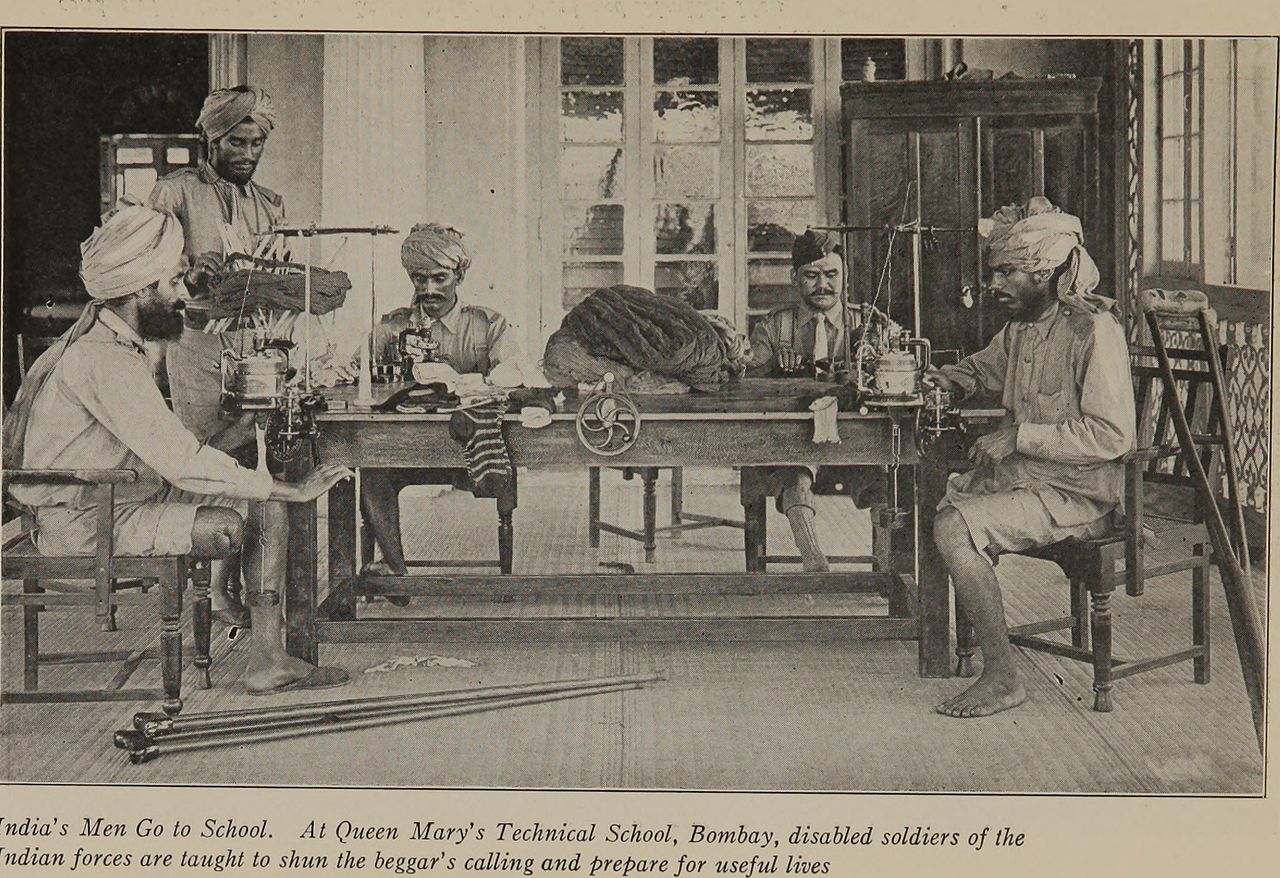
While men may be willing to defer for some months their return to regular employment,they will not have patience for a long period. Being adults, they would feel some of the best years of their life were slipping away from them and that the training was not worth the cost. At many schools in France instruction in tailoring had to be given up because it required eighteen months to bring a man to the point of proficiency, and the soldiers would not wait that long. The occupations for which training is given must not be those in which there must be expected labor disturbance or over-supply at the termination of the war.
It would be hard, for example, to find an employment better suited to a one-legged man than automobile driving. Yet the British Pensions Ministry has sent out instructions that no disabled men are to be trained for this work.

Of them all the most popular with the men is shoe-making. In practically every school throughout the country one finds more pupils in the shoe making section than in any other manual trade. In explanation of this fact one of the most successful re-educators in France has written that the men are attracted by the prospect of being able to set up their shop in their own house, so that between nailing on new soles they can run out and hoe their potatoes or cultivate a few grapes. In many parts of the country where the peasants wear wooden sabots or the clogs with wooden soles and cloth uppers known as galoshes, sabot and galosh-making share the honors with shoe making. Tailoring does not attract there turned soldier, and though there is a demand for good workmen in the trade many schools are giving up their classes.
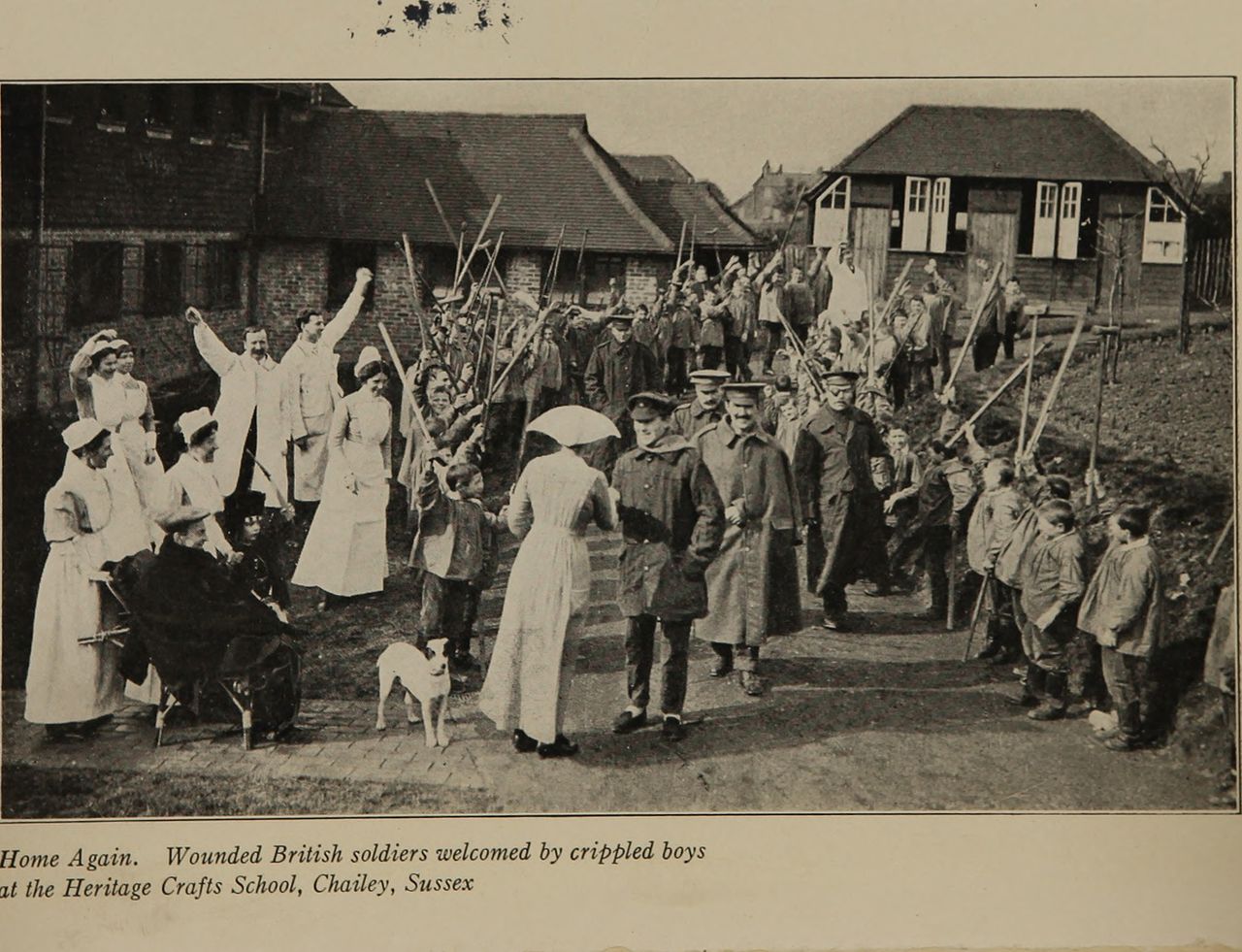
THE DISABLED SOLDIER BY DOUGLAS C. McMURTRIE Director, Red Cross Institute for Crippled and Disabled Men President, Federation of Associations for Cripples Editor, American Journal of Care for Cripples WITH AN INTRODUCTION BY JEREMIAH MILBANK Vice-Chairman, Committee of Direction Red Cross Institute for Crippled and Disabled Men
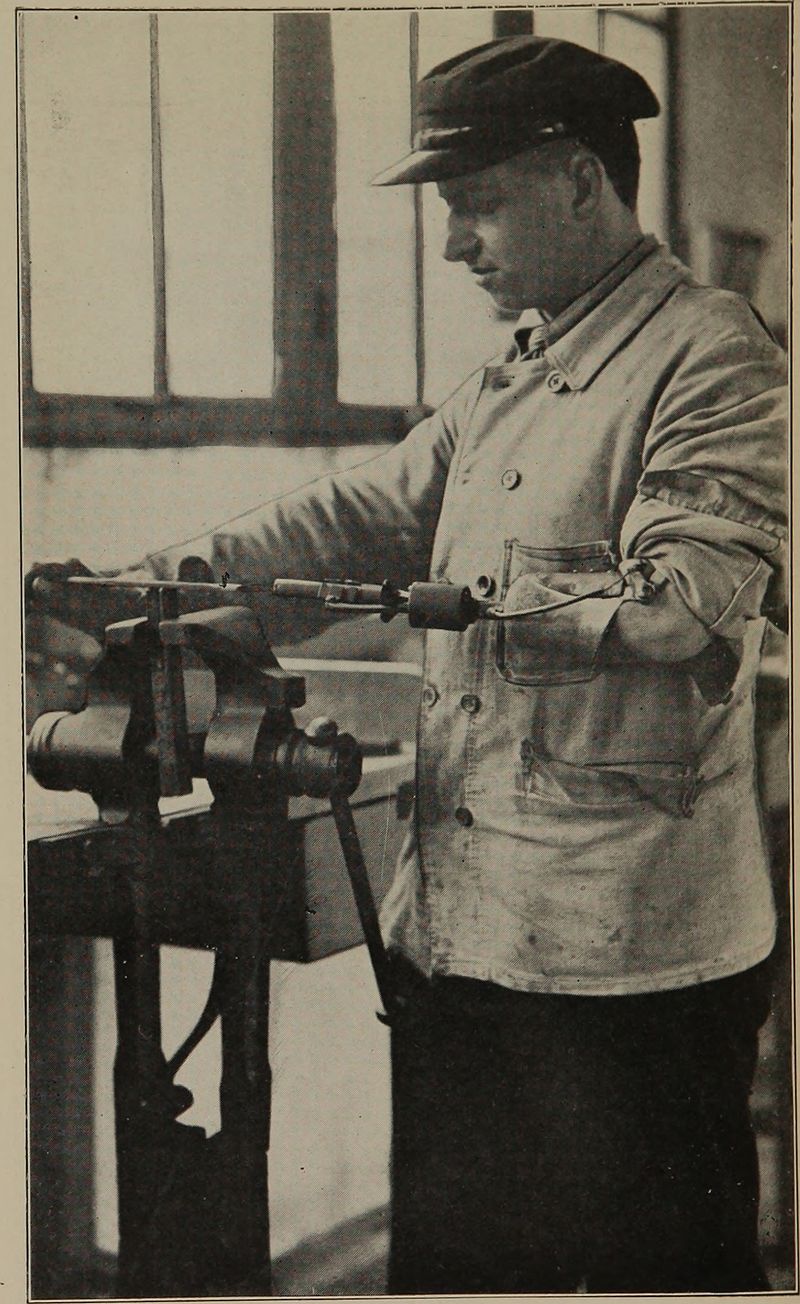
But in the modern anxiety of the surgeons to get the man back on his legs, they do not wait for fitting of the permanent limb, but put on him at once, a few weeks after amputation, a temporary peg leg made of splints and plaster, or paper-mache, or of some other similar material. The soldier then leaves his bed and takes his first steps about the hospital. An appliance of the sort meets in a most satisfactory way all the requirements of transport from overseas. A peg leg of any kind, however, if worn for some length of time gets a man in a bad habit of walking, for the reason that it must be swung outward in a semi-circular motion to bring the foot of the peg from the end of one step to the beginning of the next. This process is known Learning to Walk for the Second Time.
A Working Arm in lieu of Natures Own. A variety of tools can be fitted into the chuck of this appliance, and the one-armed poilu is again enrolled in the army of labor. In providing for leg amputations among men in the American Expeditionary Force,after the cases have been returned to this country,another improvement has therefore been made. Temporary limbs of hollow fiber, made with knee and ankle joints in practically the same manner as the final leg,are made up in standard units in sufficient numbers to meet the probable demand.

In place of grinding for a final examination upon which academic rating may be established, it is better to devote the last one or two months of training to practical work in the field for which the training prepares. When the students association at Calgary, Canada—made up of the returned soldiers being trained at the Institute of Technology and Art—were asked for suggestions regarding how the instruction might be improved, they answered that their chief concern was that they should know when they went out to a job just what was expected of them.
THE NEW SCHOOLHOUSE 63
The apprehension was that they might be made ridiculous and show up as inexperienced in comparison with other workmen who might be hired for the position. To eliminate this possibility the men are put,before graduation, at actual work of the same character as will be required by their first employer.

The Reuilly home was created as a Convalescent Home for Blinded Soldiers, without any precise idea as to what it was to do for its inmates. It was but gradually and empirically that the re-education work has been built up. One month after the inauguration of the home, a very small shop for brush-making was opened.The experiment was successful, and the brush-making shop was soon overcrowded. It is still the most popular with the men. Since 1915, however, the re-education work has greatly expanded by the addition of new trades.
At the present time, there are taught at Reuilly all the standard trades for the blind—brush-making, basket-making, making and repairing of chairs, and so on. The course of massage, which has been a marked success,consists of two sections: massage proper and theoretical instruction in anatomy and physiology. The latter includes a complete course of lectures which it is necessary to write in Braille.

ALLIES ON THE CONTINENT 165
Mastered by men with lesser arm injuries. A carpenter with a leg amputated can do bench work but cannot mount scaffolding. Since carpentry is, however, always an arduous trade and beyond the strength of many wounded men, it has been replaced in many schools by cabinet-making. Favorite courses with men who wish to practice a trade in the city are those which make them mechanics and machinists.
Peasants with a mechanical turn have opportunities to become farm mechanics, or men qualified to operate and repair tractors and other agricultural machinery. In the old days there would have been little enough demand in the French countryside for skill of this sort, but the war has changed all things, even the unchanging methods of the French farmer, and now in an effort to replace the labor of the peasant lads who have died on the battle line, an increasing number of tractors are being imported from America and put to work upon the fallow fields.

Although when a ration of disabled men to enter into competition with their normal fellows it seems to promise the best results on the whole, still it must be recognized that many men with severe physical limitations must be provided for in special institutions under favorable work conditions. Specialized machinery and carefully planned team work can make productive units of badly handicapped men with whom the average employer is not willing to bother. Large provision for this class of men has been made by the Lord Roberts Workshops, which are being multiplied in different parts of the country.Some ten years before the war the Soldiers and Sailors Help Society opened workshops in London to provide employment for disabled ex-service men for whom it was extremely difficult to find work. The work has been greatly expanded since the war, and the enterprise has taken the name of the nations military idol, who was greatly interested in the project.
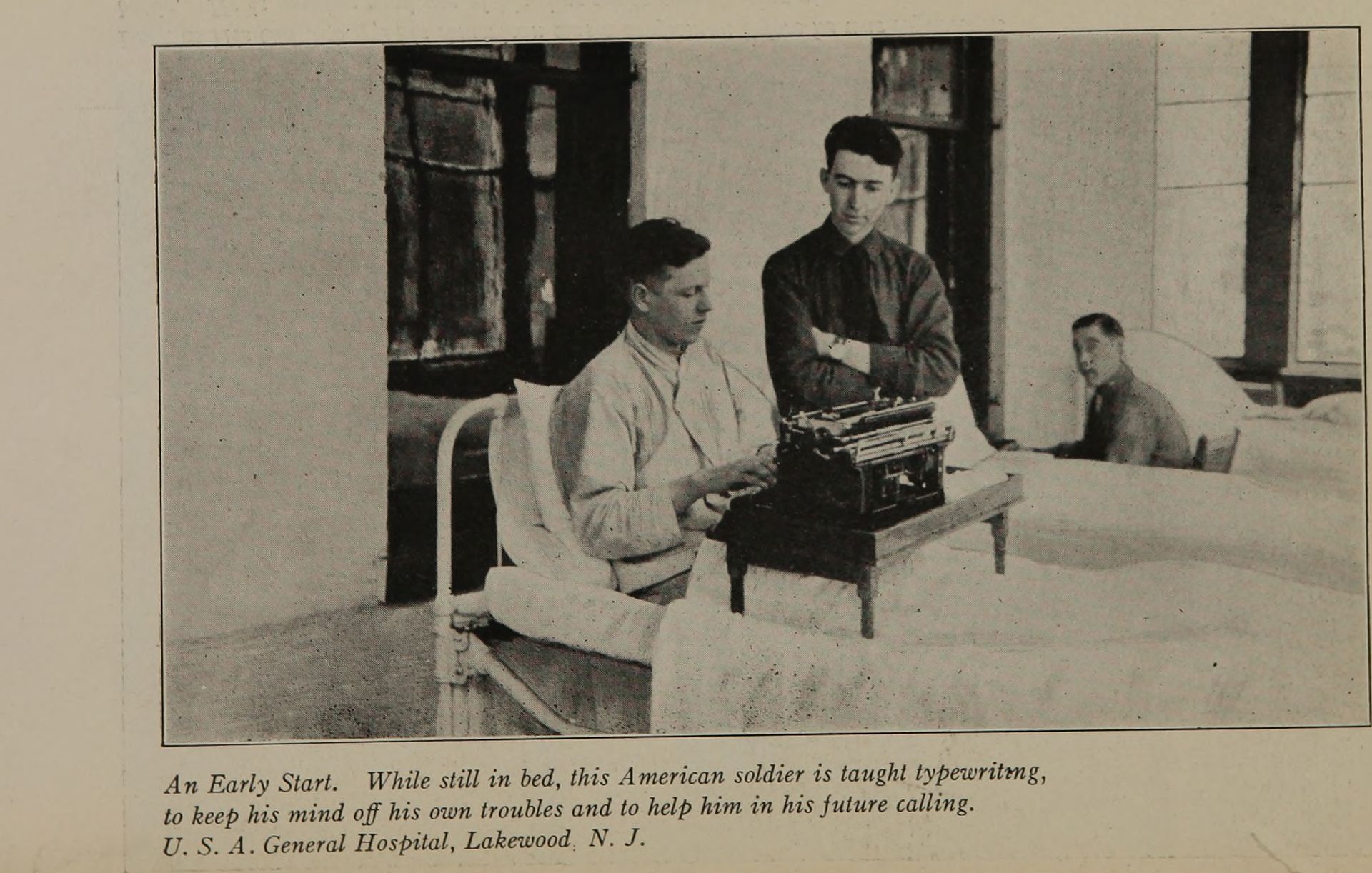
So in recent years teachers of occupational therapy or of bedside occupations have come to form part of the staff of the best civil hospitals, and in the military hospitals they are now considered a necessity. From the point of view of mental therapy it matters little what lines of occupation are offered, provided they interest the men. The more fascinating and engrossing the work, the better the mental results attained.
TO SELF-SUPPORT 39
There must be some product in which the patients will take satisfaction—which perhaps they can take away at the end of their stay in the hospital—for without product interest cannot be long sustained. From the point of view of physical therapy, it is desirable—other things being equal—that the manual exercise involved shall contribute to the process of physical restoration.

The man, however, supported by the encouragement that the social workers dealing with the family are able to inspire can often effect the right result. And finally is the tendency of the disabled soldier to conceive that he has done his duty by his country and that he should now be supported for the rest of his natural days at national expense. This is largely a question of personal character. The weak and shiftless come easily to this servile point of view, the strong and self-dependent shun it vigorously.
TO SELF-SUPPORT 47
Again, the family influence will often be the deciding factor, and this can be largely molded by the home service visitors. The adviser in the hospital has here a job in character building and it will be found that this type of effort is essential all through the rehabilitation process. Final decision on all these points of consideration will depend in large degree on the caliber of the men who as advisers are put in touch with the disabled soldiers.
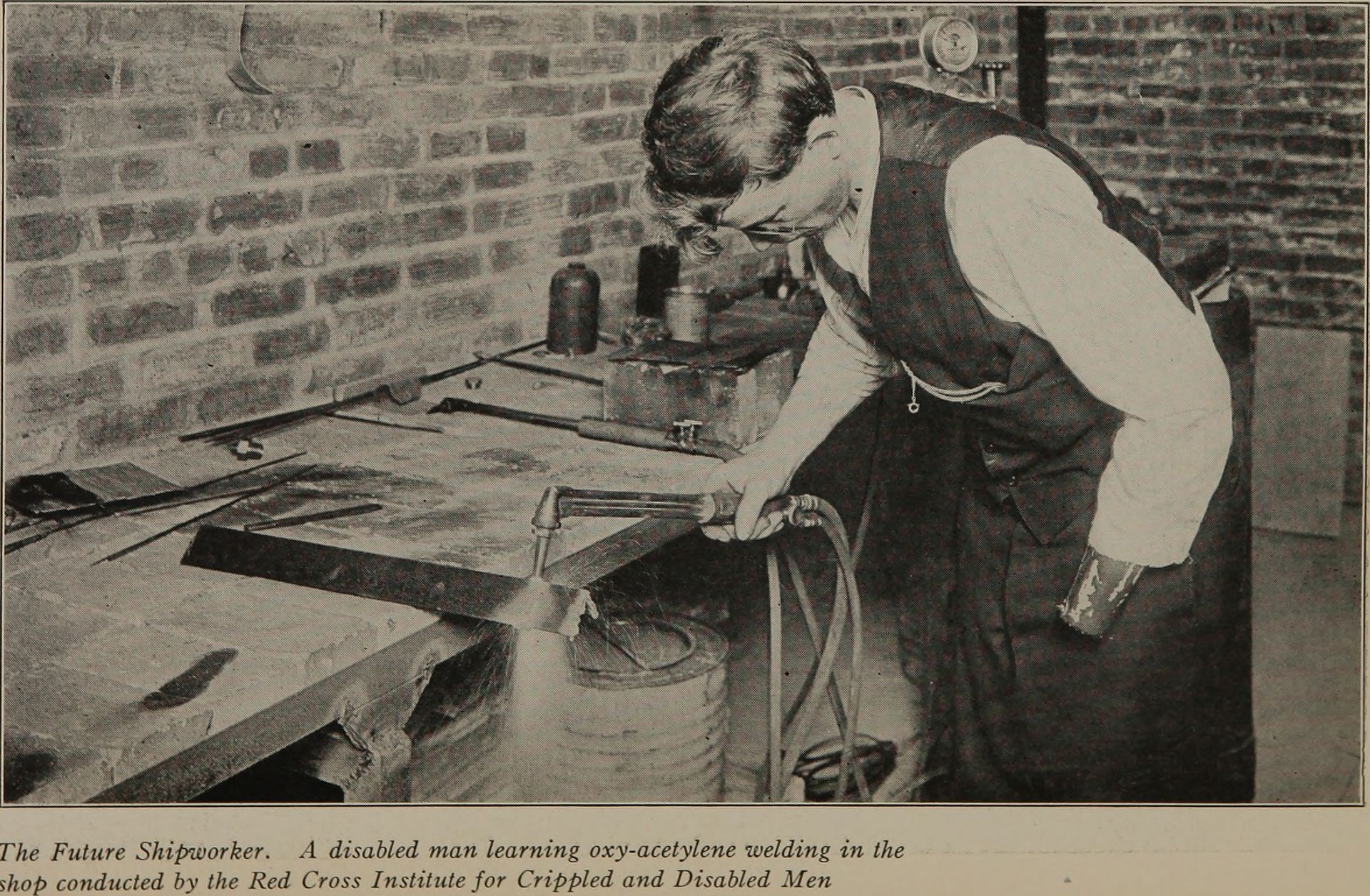
THE NEW SCHOOLHOUSE
These men are receiving the most versatile experience a chauffeur could have, and at demobilization they will be turned out into the civilian labor market to seek employment. The disabled man should not be submitted to this unusual competition. In actual practice the most popular trade being taught to crippled soldiers is motor mechanics, that is, the operation and repair of automobile engines. Too popular the school directors think it, for almost every man asked to
express his preference as to subject elects to train as a motor mechanic. There could be no better proof that the automobile still has glamour in the public eye. The work manifestly appeals to the mens imaginations, and they want to go into it whether their ability lies in that direction or not. So the job of the vocational director is to dissuade many from this first and seemingly universal choice.
Empty Text
This series of photographs depicts the challenges and obstacles that soldiers face after they returned from the war. Many returned with life-changing injuries that forced them to adapt to life at home in new ways. These men and women had to learn how to function despite their disabilities, or how to use prosthetics in daily life. Some received help from organizations like the Red Cross Institute for Crippled and Disabled Men. Others had to learn new trades of work.
This was the beginning of the field of vocational rehabilitation that we know today. It consisted of finding solutions to create artificial limbs for amputees, other medical solutions and treatments, and training in how to return to the workforce after serious injuries of all different types. Work included everything from welding, film photography, and typing, to precious jewelry among other things. All of this came out of World War I.
These issues were faced by men and women from all over the world and have been documented along with these pictures in a book titled The Disabled Soldier, written in 1919.
